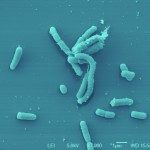Lien vers Pubmed [PMID] – 20855622
Lien DOI – 10.1073/pnas.1007765107
Proc Natl Acad Sci U S A 2010 Oct; 107(40): 17333-8
Listeria monocytogenes is an intracellular pathogen responsible for severe foodborne infections. It can replicate in both phagocytic and nonphagocytic mammalian cells. The infectious process at the cellular level has been studied extensively, but how the bacterium overcomes early host innate immune responses remains largely unknown. Here we show that InlC, a member of the internalin family, is secreted intracellularly and directly interacts with IKKα, a subunit of the IκB kinase complex critical for the phosphorylation of IκB and activation of NF-κB, the major regulator of innate immune responses. Infection experiments with WT Listeria or the inlC-deletion mutant and transfection of cells with InlC reveal that InlC expression impairs phosphorylation and consequently delays IκB degradation normally induced by TNF-α, a classical NF-κB stimulator. Moreover, infection of RAW 264.7 macrophages by the inlC mutant leads to increased production of proinflammatory cytokines compared with that obtained with the WT. Finally, in a peritonitis mouse model, we show that infection with the inlC mutant induces increased production of chemokines and increased recruitment of neutrophils in the peritoneal cavity compared with infection with WT. Together, these results demonstrate that InlC, by interacting with IKKα, dampens the host innate response induced by Listeria during the infection process.






